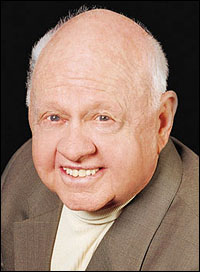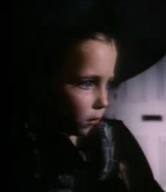Mickey, Gillian and Me
 I worked with Mickey Rooney, who died this past week, when I was a little girl. I remember doing not-much-at-all in one scene of something-or-other and being totally confused about which guy Mickey Rooney even was for most of the time, but I remember that it was a BIG deal to the adults in my family. Mickey Rooney was a big deal and rightly so. He was also the rare individual who managed to start acting as a kid and sustain that career into (and, in his case, through) his adulthood.
I worked with Mickey Rooney, who died this past week, when I was a little girl. I remember doing not-much-at-all in one scene of something-or-other and being totally confused about which guy Mickey Rooney even was for most of the time, but I remember that it was a BIG deal to the adults in my family. Mickey Rooney was a big deal and rightly so. He was also the rare individual who managed to start acting as a kid and sustain that career into (and, in his case, through) his adulthood.
A couple of months ago, Gillian Jacobs (who you probably know from the TV show Community) was interviewed in Backstage and had this to say about her own transition from being a child actor to an adult one:
“I had a very difficult time at school. I think when you have some success as a kid, your notion of being a good actor is pleasing the director, doing exactly what they tell you to do,” she says. “Juilliard wanted me to realize I had agency in my role as an actor: It was important for me to make decisions and have opinions and not just do what they told me to do to the best of my ability. I think that’s a big paradigm shift.”
I've been thinking about this passage ever since I read it because it is such an excellent and succinct articulation of one of (THE?) biggest difference between going to auditions as a kid and going as an adult and why it can be so hard to find success as an adult after a childhood career. I remember when I was re-embarking on an acting career after college, the adults around me - my parents, my childhood manager and agent - all said "you know what you're doing." And, in retrospect, I'm not at all convinced that I did. I've spent the intervening years trying to make sure I do know what I'm doing and discovering that I not only can but SHOULD have my own point of view as an artist - even as an actor saying someone else's words - is a more exciting opportunity on any given day than pleasing someone else.

Still, going in with that need to please - equating pleasing others with "success" - is a difficult habit to break, particularly when one has received so many positive strokes for that very thing growing up. It's something I continue to work against - with mindfulness and practice - in the interest of being a truly excellent artist. Even more, though, I don't think that this people-pleasing as an undermining factor in living a fully self-actualized life is limited to former young performers. It seems to me that we get stuck in lots of roles we played as people growing up and that determining who we really are (and who we really want to be) is a huge part of becoming an adult and finding personal success for all of us.
Mickey Rooney had his share of ups and downs. In his NY Times obit, Aljean Harmetz writes:
Although his career was one of the longest in show business history — almost 90 years separated his first movie from his last — it was crammed with detours and dead ends. (“There have been crevices, fissures, pits, and I’ve fallen into a lot of them,” he told The Times in 1979.)
It would be facile (not to mention presumptuous) to assume that those ups and downs all stemmed from a people-pleasing need, but hard not to suspect that that impulse wasn't at least one of the challenges in Mr. Rooney's mix.
What outdated aspect of your identity are you still carrying around or wrestling with? How have you moved beyond that limitation and what has that meant for you? Tell us all in the comments!
